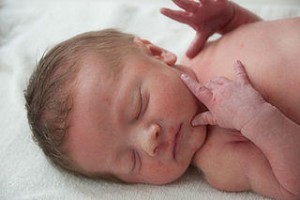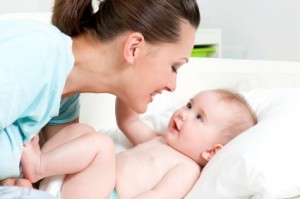7 Ways To Help Your Baby Sleep Better And Longer
Getting an infant to sleep is not an easy task. A baby can be well fed, have a clean diaper and be gently rocked for long periods but may still not sleep. It often proves to be frustrating for both parents and caregivers but can be much worse if the baby cries non-stop during the time awake. Parents may be at their wit’s end trying to find the reason why a baby is not having a good quality sleep but sometimes the most obvious problems are missed. It is always important to speak to a pediatrician – your baby could be unwell even though there are no otherwise obvious symptoms.
The basics may be obvious to most parents – feed regularly, change the diaper, make sure they are tucked in, a short lullaby and some gentle rocking. But it is not always a fool proof formula. All too often babies are labeled as being ‘colicky’ when the exact reason why he/she is not sleeping cannot be identified. But sometimes it is the simplest of measures that can make all the difference and help baby sleep soundly for at least a few hours.
Burp Baby After Feed

Burping, or breaking wind, is an important way to ensure that baby is comfortable after a feed. Most people swallow air when eating or drinking and babies are no different. In fact babies are more likely to swallow larger amounts of air relative to the feed and their body size than older children or adults. These pockets of air within the gut cause significant discomfort and can keep your baby up crying for long periods of time. You may sometimes find that despite your best efforts, baby does not burp immediately. But keep trying.
You should keep baby upright until he/she burps. It is best to burp baby after feeding on one breast or after he/she drinks about 2 to 3 ounces of milk from a bottle. After successfully burping, you can then continue feeding. It may just take a few minutes for baby to burp but if after 15 minutes there is no audible burp, then continue with feeding or other activities. Do not be alarmed if baby brings up some milk during a burp. This regurgitation is normal.
Dress Baby Appropriately
All too often parents indulge their own personal fancies by dressing baby in clothing that is uncomfortable. Frilly, ‘scratchy’ and thick padded baby clothing can mean that your baby is not going to be calm, quiet and sleep easily. If you baby has skin conditions like atopic dermatitis (eczema), then certain textiles can irritate the skin further and intensify the itching. Since baby cannot express his/her in discomfort in words, you will find that baby will be capricious, inconsolable at times, not feed well and have poor sleep patterns.
Just as you would dress comfortably at bedtime, the same should apply to baby. Natural textiles that are loose fitting are the best option. It does not mean that you should not dress baby warmly when it is cold. But make sensible choices when purchasing baby clothing. If your baby is not sleeping well, try changing the clothing. Sometimes a fresh set of clothes may do the trick. If baby is not responding to being warmly dressed then try to remove some clothing, and vice versa.
Control The Room Temperature
There is much confusion about how warm or cool a room should be in order for baby to be comfortable. Sometimes an adult’s judgement may not be a baby’s preference. Remember that newborns are used to warm surroundings, but not too hot. The body of a newborn baby is not able to regulate the body temperature as effectively as older child. So make sure that it is neither too hot, nor too cold. However, as baby grows a little, he/she will have similar temperature preferences to others in the house.
Dress baby warmly if the environment is cold. Try to keep the heat on. But also ensure that if the room heats up then the clothing will not be too hot for baby. As with older children and adults, baby will tend to sleep better in a room where the temperature is lower. You will want to keep the room temperature around the 77F (25C) mark when baby is awake and active. Newborns may prefer slightly higher temperatures. For sleeping, a room temperature around 70F (21C) may be a better option. But ensure that baby is adequately covered, especially if the room temperature is lower than 60F (15.5C).
Stay Calm With Baby

Babies are very sensitive to the emotional state and behavior of those around them. For this reason it is important to stay calm around baby. If you are agitated for whatever reason, then baby may also be excitable and anxious. Being a new parent can be very trying but it is important to find ways to cope and manage your stress. Sometimes the stress may have nothing to do with baby. But your child may still be able to sense it when you are near him/her.
Try to get enough sleep as a lack of sleep is one of the major contributors to psychological stress. Ask others for help with baby or with other chores, especially if you are a single parent. Remember that while it is important to give baby the best care possible, you also need to take care of yourself. And if all else fails, do not hesitate to see a psychotherapist or counselor. Sometimes it is not the situation itself that is a problem as much as your poor coping skills to handle the stresses and strains of life with a baby.
Sleep With Baby On Your Bed
If you have baby in a nursery and he/she is not sleeping well, then try to spend short periods of time sleeping with baby. Many baby care ‘experts’ will tell you that this is not advisable as baby needs to learn to be alone. However, baby does not have the same level of understanding as an older child. Do not be fooled in thinking that babies do not experience loneliness. Humans are social creatures and baby needs to be close to people at times – especially with the parents.
A short nap with baby may help him/her sleep better. Many babies tend to sleep better when lying on the chest and abdomen of a parent. The sound of your heart and breathing are familiar sounds for baby and can comfort them. You will not be teaching baby ‘bad habits’ by having short naps together. More than anything you reinforce the emotional bond which is important for baby’s growth and development.
Give Baby A Bath And Massage
Although it is not advisable to bathe a newborn daily, a warm bath and massage can do wonders in calming down baby and helping him/her sleep better. If frustration is setting in after trying everything else, then take the time to give baby a bath and massage. Bathing provides baby with a warm watery environment that he/she was accustomed to for many months when in the uterus. Avoid hot baths even though you may find it relaxing. Babies are not as tolerant to heat and tend to lose a lot of body heat after a hot bath.
Many studies have shown that human touch is important for baby’s growth and development. A massage is one way of ensuring sufficient touch while also relaxing baby. Just as you would find a massage relaxing, so does baby. Remember that it should be gentle touch as baby’s body is delicate and pressure that you may find comfortable many not be so for baby. Always ensure that the room is warm as baby will be naked when being massaged and can lose heat easily.
Minimize Sensory Stimulation

It is important to reassess baby’s surroundings where he/she sleeps. Babies are sensitive to stimuli – light, temperature, sound, odors and touch. You may not realize that there are stimuli that baby finds exciting or intolerable. These stimuli can be disturbing baby’s sleep. Look for the obvious stimuli within the room like the color of the walls, lighting and room temperature. Check if the room has any distinct odor. It may not necessarily be an unpleasant odor but could be the smell of a newly painted room, certain toys or damp walls.
Remember that some of baby’s senses are more acute than yours as an adult. What may seem barely noticeable to you can be disturbing for a baby. And it is possible that your senses have adapted to certain stimuli which can be a problem for baby – like the odor of your house or street noise. Try to minimize any stimuli within the room and even let baby sleep in another room for a few nights to see if there is a difference. If baby is responding to the change in environment, it may be the room where he/she sleeps that is the problem.





